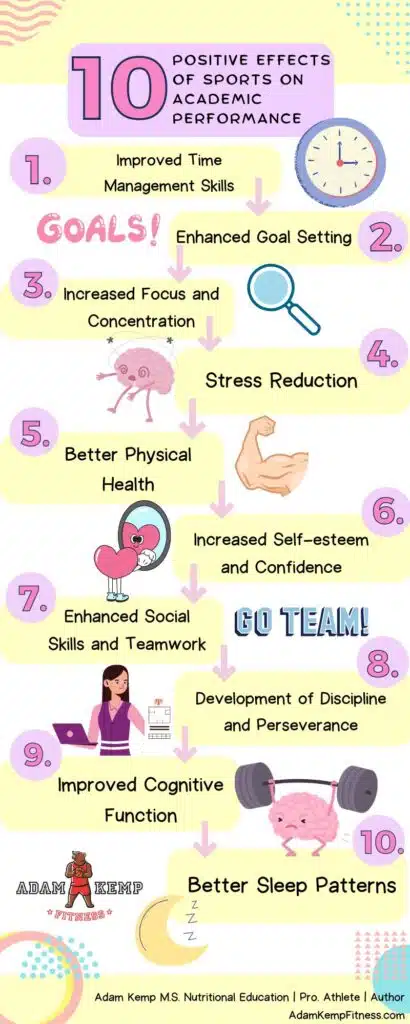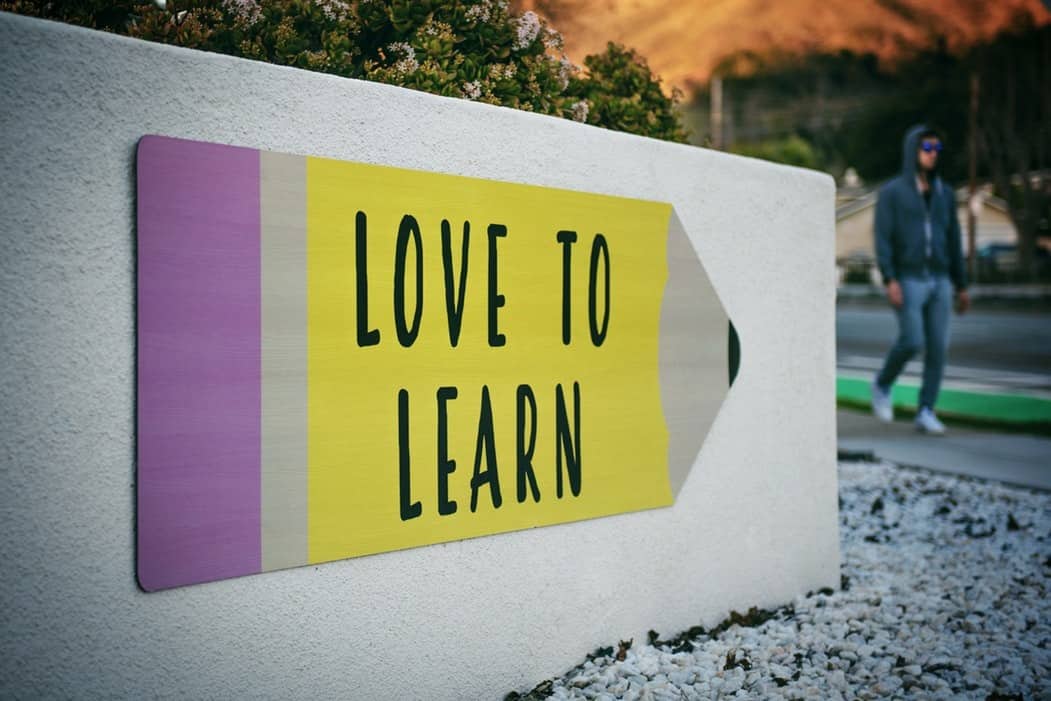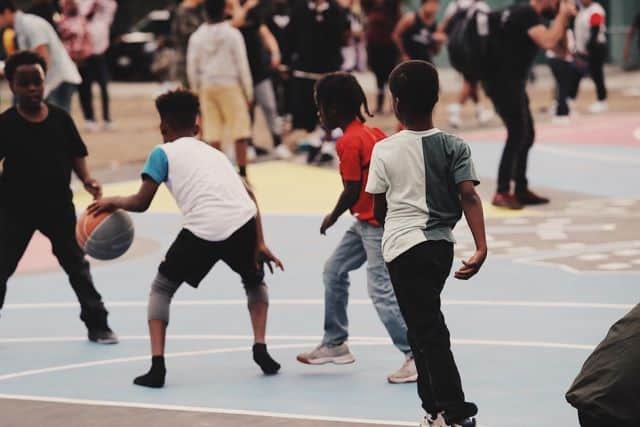Sports and Academic Performance: Do Sports Impact Grades?
The connection between sports and academic performance is a fascinating and important topic for educators, parents, and students. While the physical benefits of sports are well-known, the influence of athletic participation on academic success reveals even more valuable insights.
As a professional athlete and college graduate with a Master’s degree, I can personally attest to the direct connection between sports and academic performance. Don’t just take my word for it—check my report cards, or better yet, ask my mom!
From the time I started organized sports in 5th grade through college, my worst report card of the year was always the one that came after basketball season ended. With too much free time on my hands, my focus would slip. Ironically, staying busy with sports helped me stay sharp in the classroom.
I believe I’m a good source to say that, as I’ve been involved in school and sports pretty much been in school my whole life! After graduating high school, I went to The Winchendon School in Winchendon, Massachusetts, for a post-graduate year to improve physically before heading to college.
Then, I spent four years earning my degree at Marist College, and after some time playing pro basketball, I decided to hit the books again for two more years to get my Master’s in Nutrition Education. It’s safe to say I’ve logged plenty of classroom hours!
But my experiences aren’t the end of the story.
Research also consistently indicates that participating in sports improves GPA, test scores, cognitive development, and overall academic achievement.
Beyond physical fitness, sports taught me discipline, time management, focus, and several other skills, which directly translated into success in the classroom.
Additionally, research shows that integrating sports into educational programs enhances student preparedness for the future. Encouraging inclusivity and participation in sports fosters an environment where students are better equipped for academic and life challenges.
I strongly believe that sports and academic performance should work hand-in-hand in school curriculums, and parents should encourage their children to get involved in sports for both personal growth and academic success.
Here’s a closer look at how the relationship between sports and academic performance!
How Does Participation in Sports Improve Academic Performance?

Several factors exist in the relationship between sports and academic performance. Below are some of the factors which affect students’ academic performance who engage in sports:
Improved Time Management Skills
Athletes must often juggle training, competitions, and academic responsibilities.
This necessitates the development of superior time management skills.
Research indicates that student-athletes tend to be more efficient and better organized in their use of time, which directly benefits their academic performance (Trudeau & Shephard, 2008).
They learn to prioritize tasks and manage their schedules effectively, a skill that is invaluable in an academic setting.
Enhanced Goal Setting
Participation in sports instills a sense of purpose and direction through goal setting.
Athletes are trained to set specific, measurable, achievable, relevant, and time-bound goals (SMART goals), a process that can be translated into academic achievement.
This mindset helps students set academic objectives and strive towards them with dedication and consistency.
Increased Focus and Concentration
Regular physical activity, such as participating in sports, has been linked to improved concentration, attention, and classroom behavior.
Studies have shown that physical activity can enhance cognitive functions like memory and executive control, which play a significant role in learning and academic achievement (Singh et al., 2012).
Stress Reduction
Physical activities, including sports, are effective in reducing stress and anxiety.
Stress can significantly impair academic performance by affecting concentration, memory, and motivation.
Exercise triggers the release of endorphins, known as ‘feel-good’ hormones, which act as natural stress relievers.
This improvement in mental well-being is beneficial for students in coping with academic pressures (Ratey & Hagerman, 2008).
Better Physical Health
Engaging in sports promotes better physical health, which is directly related to academic performance.
Healthy students are more likely to attend school regularly and are better equipped to engage in learning activities.
Physical health impacts energy levels, immunity, and overall ability to participate in school activities (Penedo & Dahn, 2005).
Increased Self-esteem and Confidence
Sports participation can significantly boost a student’s self-esteem and confidence.
Success in sports provides a sense of accomplishment and reinforces the belief in one’s abilities.
This heightened self-confidence can translate into a more positive attitude toward academic tasks and challenges (Eime et al., 2013).
Enhanced Social Skills and Teamwork
Team sports are particularly effective in developing social skills and teamwork.
These sports require communication, cooperation, and understanding among team members, skills that are highly valuable in collaborative academic projects and group learning environments.
The ability to work effectively in a team is a key skill for academic success (Slutzky & Simpkins, 2009).
Development of Discipline and Perseverance
Sports require discipline, commitment, and perseverance, qualities that are equally important in academic pursuits.
Athletes learn to stay dedicated in the face of challenges and setbacks, a trait that can help students persevere through difficult academic tasks and assignments (Dotterer & Wehrspann, 2016).
Improved Cognitive Function
Regular participation in physical activities, such as sports, is associated with enhanced cognitive function and improvements, such as becoming a better writer.
Studies have shown that exercise can lead to improvements in mental health, brain health, and cognitive processes such as memory, attention, and processing speed, all of which are crucial for academic success (Hillman et al., 2008).
Better Sleep Patterns
Engaging in regular physical activity is known to improve sleep patterns.
Quality sleep is essential for learning and memory consolidation.
Good sleep helps maintain focus, decision-making abilities, and creativity, which are all important for academic performance.
Athletes often experience deeper and more restful sleep, which contributes to better academic outcomes (Driver & Taylor, 2000).
Final Thoughts: Are Sports Good for Academic Performance?

The link between sports and academic performance runs deeper than most people realize. From my own experience as a professional athlete with a Master’s degree, I’ve seen how sports shape not just physical health but also mental sharpness, time management, and self-confidence.
Additionally, sports boost cognitive function, improve focus, and teach essential life skills like discipline and perseverance—all of which translate directly to the classroom. Structured fitness classes for kids provide many similar benefits, but nothing beats the actual benefits of team sports!
It’s not just about staying active; it’s about learning how to manage stress, stay motivated, and work as part of a team.
These are skills that help students thrive, both academically and personally.
Sports aren’t just an add-on to education; they’re a core part of developing well-rounded, successful individuals. When schools, parents, and policymakers recognize this, they can create educational programs that set students up for success, both in school and beyond.
Read Next: Top 10 Health and Fitness Tips for Children



